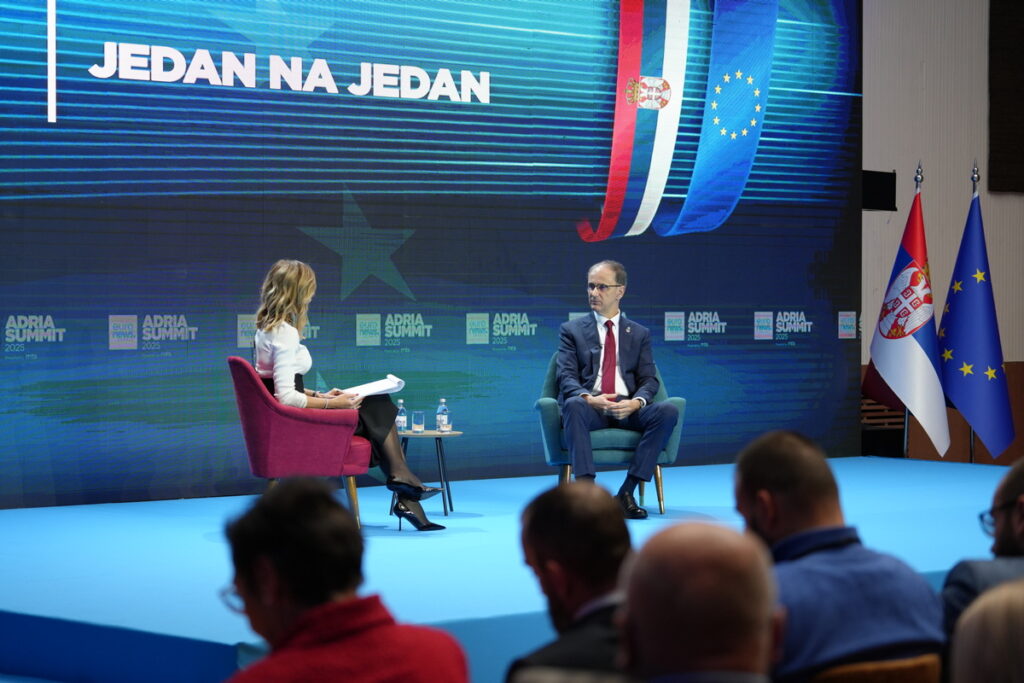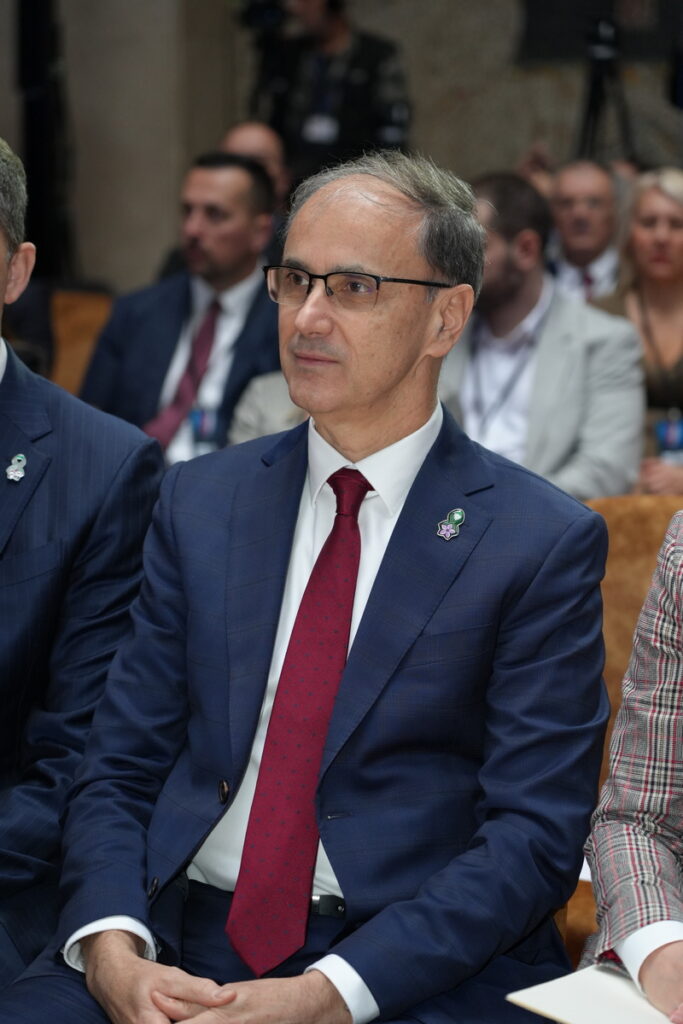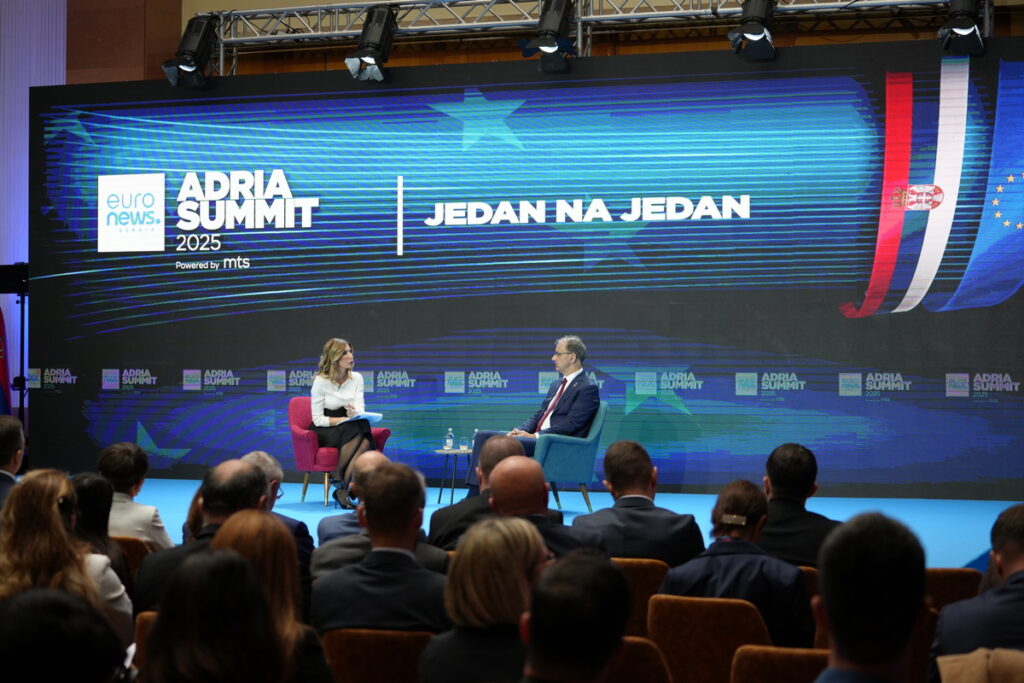Prime Minister Đuro Macut on EU hurdles, political tensions and the realities of foreign-policy balancing

FEATURED INTERVIEW
by Minja Miletić
Prof Dr Đuro Macut
Prime minister
In an exclusive conversation at the Adria Summit — organised by Euronews Serbia — Serbian Prime Minister Prof Dr Đuro Macut reflects on the country’s strategic path toward the European Union amid a shifting geopolitical landscape. Speaking with Euronews Serbia journalist Minja Miletić, he addresses the political obstacles shaping Serbia’s accession process, the realities of foreign-policy alignment, and the delicate balance between national interests and international expectations. This interview offers a detailed look at how the Serbian government perceives its current position, its priorities, and the steps ahead in navigating one of the most complex periods for European integration in recent years.
We are very close to the European Union — the obstacles are political, not technical
You took office after your election in April, at a time of considerable tension and political challenges. Back then, you emphasised that Serbia remains firmly on its strategic path toward the European Union, stating: “We believe in Europe, but above all in Serbia.” You also said that Serbia seeks a Europe in which its voice is heard, where differences are a strength rather than an obstacle. What, today, is the greatest barrier to Serbia’s voice being heard? Is it, as Prime Minister Brnabić suggested, a lack of unity on this issue?
I think we were given an excellent starting point for this conversation, because the Speaker of Parliament opened a series of key topics related to European integration. As I said then, and have repeated since, we are in Europe. We are already formally in Europe; what remains is the formal verification of our presence in the community of nations to which we have belonged for as long as Europe has existed and for as long as we have lived on this land.
The essential question, as she noted and as you mentioned, is whether we are actually close to joining Europe. I believe that is the crucial question. We are very close. But there are obstacles that are formal yet invisible, and in a figurative sense, they make the process seem insurmountable. These are political obstacles.
In every technical sense, we have met the conditions to be part of Europe, but the final decision rests with the member states. Therefore, I believe we are closer than ever before to joining, because we have fulfilled all the prerequisites. Through various meetings I have had as prime minister over the past six months, I have gained the impression that everyone understands, respects and values us — and that only one moment is missing, a single trigger.
That could be the opening of Cluster 3, as mentioned, or the beginning of the accession procedure itself. One example is the London Summit, which was part of the Berlin Process.
You say we are technically ready, but the problem is political. Last week, we received the European Commission’s report. A conference was held with the EU Ambassador to Serbia, Andreas von Beckerath, and the President of Serbia, Aleksandar Vučić. A debate immediately began over the report, that it was harsher than ever. How did you perceive it? As criticism, or as a balance between praise and critique?
I think it is more the latter, although it can also be interpreted as criticism. Considering the imbalance in the accession progress of other countries in the region — despite their notable activity and efficiency — the report is essentially a balance between what Serbia has been trying to achieve for years, EU integration, and what we still need to do.
So yes, it is a balancing act, but we cannot say that Serbia has not made important steps. We have made significant progress, and the past few months show that we have accelerated. This is something the Government of Serbia will certainly continue to take on.

When you say “take on”, the President said at that press conference that reforms are needed — in the rule of law and the judiciary — and that people in the government may need to work harder on these issues. How did you interpret that message?
I would say it is a good message from the President, one that gives the government an even stronger mandate to continue these activities. In that context, I have already formed clusters of ministries within working groups, each with clear tasks and timelines for achieving their goals.
The first goal concerns the end of 2025 — by then, we must finalise the legislative solutions that will be sent to Brussels. By the end of 2026, we will have a series of steps to complete. These are mostly technical matters related to the package of laws that must be adopted by the end of 2026.
So, we will be very active. Ministers have received clear instructions, we are working on it, and there are parameters and monitoring indicators. I will follow this process closely, and I hope to be satisfied — as well as the ministries involved, the Parliament that will receive the draft laws, and, overall, I believe we will remain aligned. The dynamics are in place, and we must take this seriously.
Serbia holds a clear pro-European position, but we must protect our national interests with a balanced approach
There is a recommendation to open Cluster 3, which would, after four years, truly unblock our path. One of the requirements in the report was the adoption of the Law on the Unified Voter Register, which the Parliament has now adopted. We saw that the European Commissioner for Enlargement, Marta Kos, welcomed this on X. Do you expect the EU member states to give the green light for opening Cluster 3?
I think the Speaker of Parliament was right — that dissonance in the Assembly is real and very clear, but it is also a strange situation. These issues should not be used for political point-scoring. These are matters of national interest if we want Europe in Serbia — and we are already part of it.
We need to meet the standards as soon as possible and create conditions on our own political scene so that there are no divisions in how these issues are approached. It is a good point, and we should speak about it openly.
Listening to the last two parliamentary sessions, I got the impression that, out of ten questions or comments, only one or two were actually related to the agenda. If we translate that to matters concerning the European Union, one could say there is dissonance.

In fact, it is not real dissonance — it is declarative rather than functional. A lot of time is lost on things that are, I would say, irrelevant.
Is it only dissonance, given that one of the criticisms we face is the anti-European narrative? This is also being mentioned — coming from the media, from politicians, and then spilling over to citizens who have been waiting far too long for progress in this process.
I think it is again a mix of factors. It is completely clear that we hold a pro-European position. We are a country in Europe. Personally, as Prime Minister, everything I have done in my professional life has been tied almost exclusively to Europe. I think there is a significant misunderstanding about how we should formalise that position. We are already there — perhaps there is a formally invisible declarative layer — but if we analytically examine all the texts appearing in the media, including yours, which is specific because you have an objective approach to Europe and the EU, you won’t find harshly negative commentary elsewhere either.
I wouldn’t say there is a wall of opposition. We need to be inclusive. We must involve everyone on our political scene, but also in society at large. Everyone in academia, and in other key social sectors — the pillars of society — should be declarative in this sense and work proactively. I don’t think there is…
And why don’t we have that, Professor?
Perhaps there is not enough readiness for dialogue. We need to talk more and move beyond daily political issues. There is always some new event that disrupts the picture and pushes us back for a while. I don’t think that is a good thing.
And this, as they say, is something we witness every day in our public life.
But aside from the requirements we discussed, one of the key expectations the European Union has of us is to align our foreign and security policy with EU policy. How should we understand that now? When will it happen, given that you say our strategic goal is EU membership, yet we maintain special relations with both Moscow and Beijing?
Yes, it is a very complex situation, and we, as a small country with a small population, must take care of our national interests. Whether those interests are regional or broader and international depends on the moment at which we are speaking. I think we need a balanced approach to both East and West.
We are more closely connected with the West — that is clear — but we cannot forget the East. However, there is also a third actor: the South. There is the Global South, as it is called in the East, and the United Nations is the main advocate of that concept.
We are a founding member of the United Nations, but also of the Non-Aligned Movement. In that sense, we must look to all our former and current friends. We are not in a position to be exclusively tied to one side.
Nor can we, even economically, give up certain current partnerships. We must work on alignment, but that should not become a factor that distances us.
The alignment percentage is misleading — a single sanctions package can outweigh our entire strategic progress
All right, but how can a small country maintain an independent foreign policy in a world of great powers?
Exactly — we have to balance. In the integration process, we will remain flexible and work toward that goal.
But the percentage of alignment is an interesting category. At the moment, we meet 65% of the alignment requirements, which is a high percentage. If we look at other countries in the region, some of them have an even higher percentage.
The question is why the gap is so large. And that comes from the international context. More than 20%, perhaps even 30% of all requirements relate solely to sanctions or to our position toward third countries in terms of sanctions.
If you break down those percentages, you see, for example, 20 sanction packages against a single country, which carries a large share of the alignment percentage. So technically, we are very close to meeting everything. But when you look at the structure of what we still lack, that is where the problem lies.
The question is whether it is realistic that our stance on sanctioning a single person or specific individual in the East has the same weight as our global position on major crises in the world, such as those in the East. One example is the relationship between India and Pakistan — a major international crisis, on which we have a clearly defined position and do not support such actions.
Yet that is placed on the same level as one case or one person, and the two are treated as equal. The system of percentages used in the accession process is highly questionable and applies selectively to certain countries. In that sense, we see a degree of inadequate treatment on the part of the European Union as well.

Yes, but it seems that the relationship with the European Union and with Russia here is viewed mostly through the issue of Kosovo and Metohija. That is something extremely important to us. In that light, do you see the European Union as a sincere partner to Serbia?
I would say it is a partnership, certainly. Whether it is fully sincere, it probably is. If you ask EU officials, they will say it is. But the constant postponement of getting the provisional authorities in Priština to complete what they committed to in 2013 shows a certain degree of EU inaction toward them.
I would call it a stalemate and a level of diplomacy that cannot be endured. It cannot be tolerated indefinitely.
We have recent examples, such as the meeting in London, where Mr Kurti, representing those institutions, was the only one who spoke negatively about his northern neighbour, framing everything as his own internal problems. In other words, we avoid addressing issues at home and shift everything onto someone else.
That is a serious problem the European Union must, in some way, address. It is unacceptable that the process has been blocked for so many years by only one side.
All right, but would you say that Russia uses Kosovo and Metohija to maintain its influence here in Serbia? Is it sincerely defending our interests?
I would say it is a traditional friend that genuinely defends and understands our situation. Given that they have also gone through various periods of disintegration and structural changes in recent decades, I believe they clearly understand our position — just as some other members of the Security Council do.
So we have significant polarisation in that sense. What matters to us is that some countries fully understand our position, while others do not. I think we must keep that balance in mind and be responsible toward the group of major countries that do understand us.
Right, and we come back again to fulfilment. This is something Brussels strongly insists on, and you yourself said — in your statement for TASS — that you will not introduce sanctions against Russia. You said: “As long as I am Prime Minister, the Serbian government will not join the sanctions against Russia.” So I ask you — how realistic is this general policy of balancing?
I think it is possible, but of course, it needs to be aligned with our partners in the European Union. That is not the decisive framework. As I already said, we have met 65% of the requirements.
But that political segment, relating to one country and one situation, is expanded to unprecedented proportions, and what you have achieved — those 65% — is then significantly diminished. What will happen if a historic agreement between Russia and Ukraine is reached? What then?
Will those 20% or 30% concerning us disappear? I think the matter is very flexible. I believe the entire energy crisis and everything happening now can be resolved easily if major changes occur.
Not everything should be reflected onto us. We are not some “role example” to be used as a negative case for everything.
All Photos: Filip Kovačević